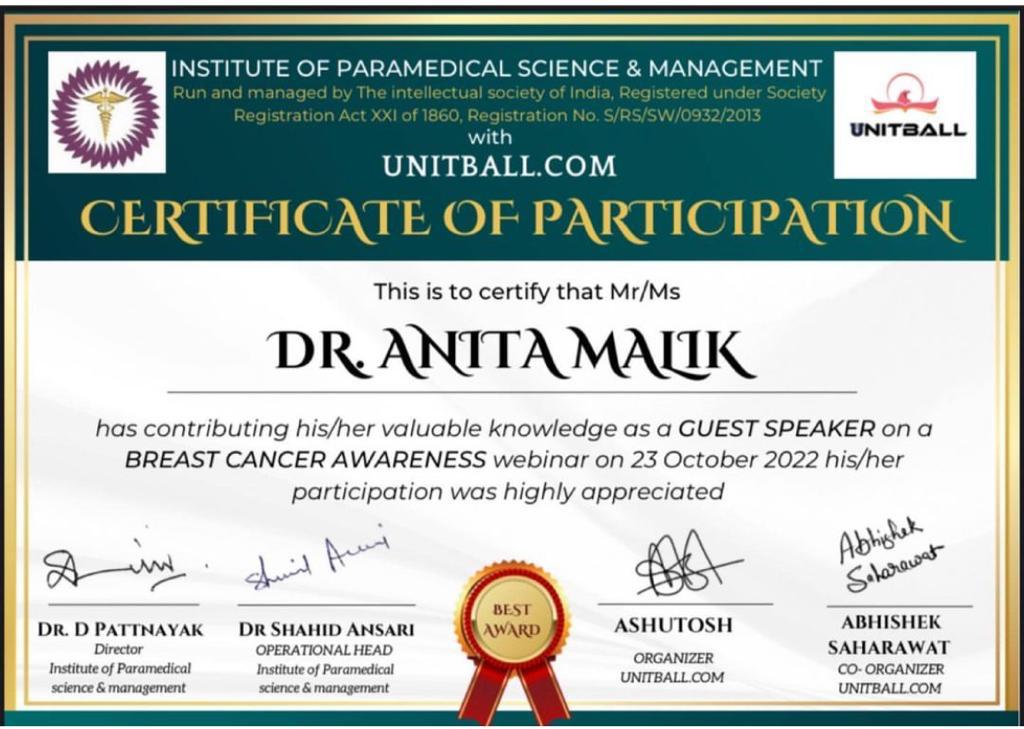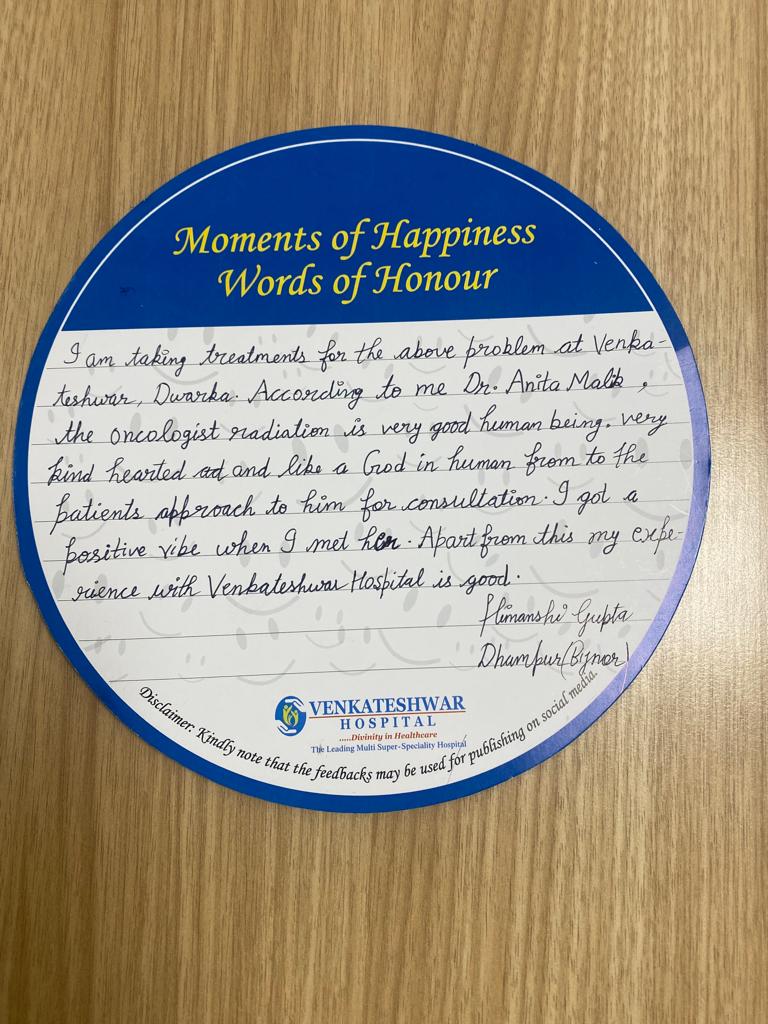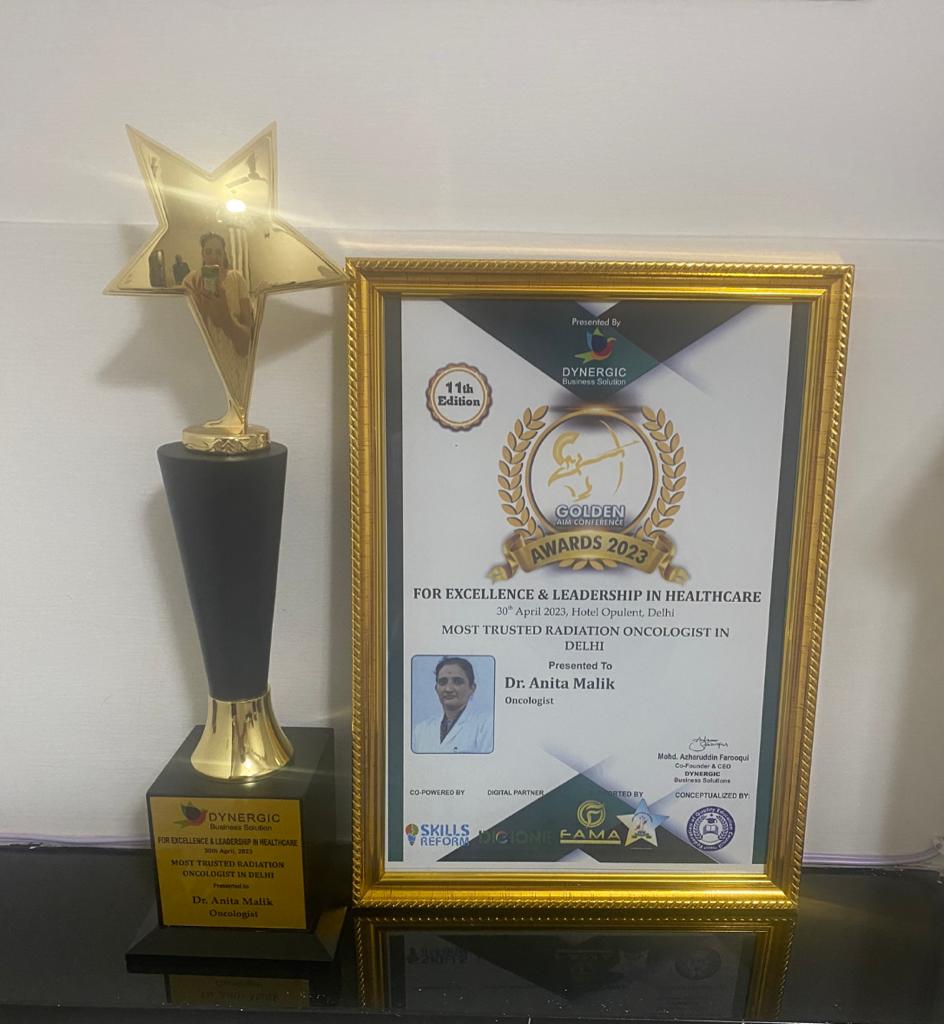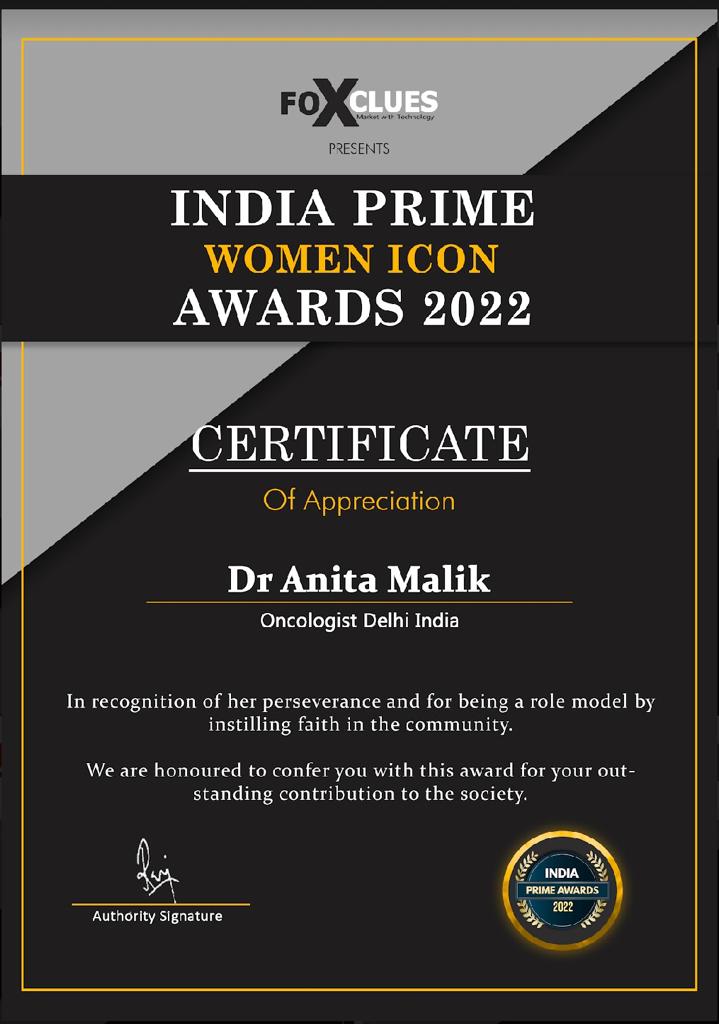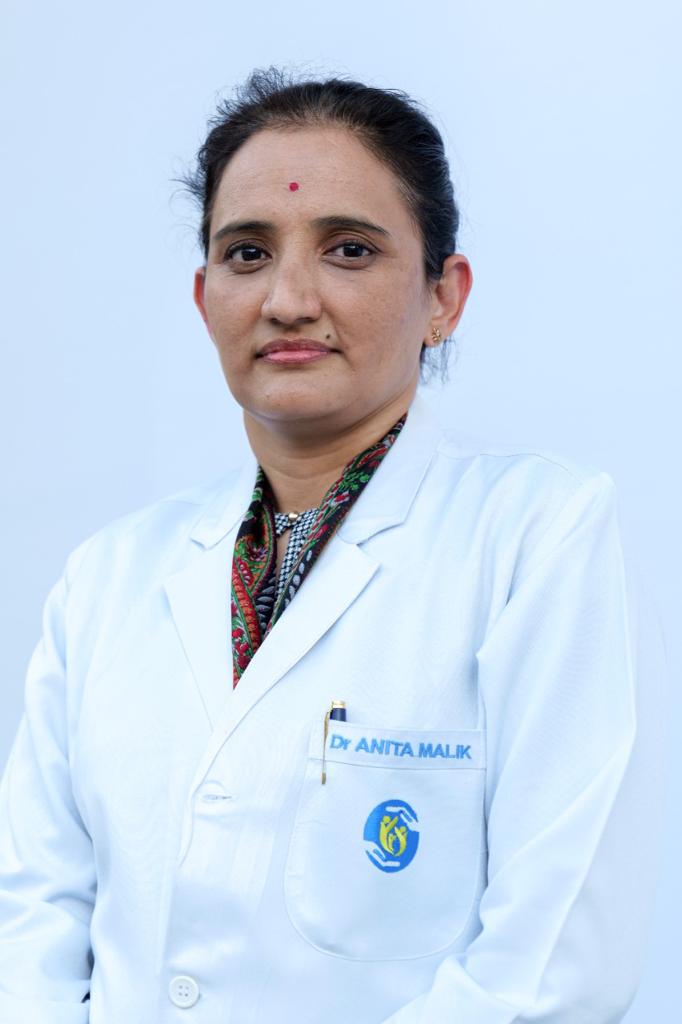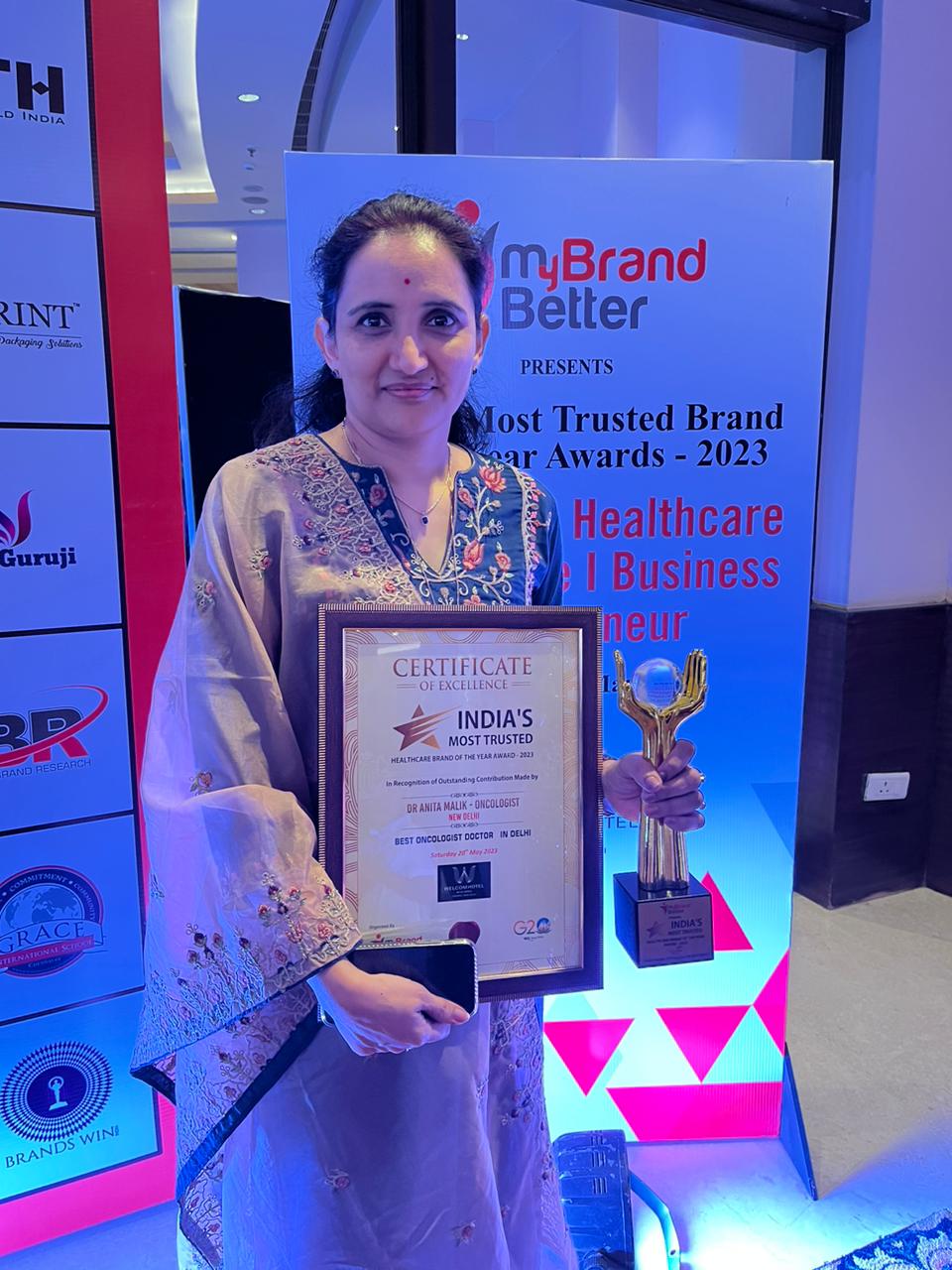
Don't Let Cancer Break Your Spirit.
Dr. Anita Malik specialises in radiation oncology
Dr. Anita Malik specialises in radiation oncology
Get a Second Opinion
Empowering patients to make the right decision related to their diagnosis and treatment.
Consult us for an expert perspective on your suggested diagnosis and get reassured about your treatment with the help of a comprehensive analysis
We offers the best cancer treatments in the world, with highly advanced treatment equipment and expert oncologists delivering excellent patient outcomes through multidisciplinary care, innovative technology, and patient-centric approaches.
This comprehensive care includes:
• Surgery: Highly effective for localized cancers, especially when detected early. Surgery aims to remove the tumor completely and is often the first choice for solid tumors.
• Chemotherapy: Widely used for many cancer types, either alone or with other treatments. It uses drugs to kill fast-growing cancer cells throughout the body, including those that may have spread beyond the primary tumor site.
• Radiation Therapy: Uses targeted radiation to destroy cancer cells, often paired with surgery or chemotherapy. It irradiates tumor sites while sparing surrounding healthy tissue as much as possible.
• Immunotherapy: Boosts the body's immune system to recognize and fight cancer. Especially beneficial in cancers that have resisted traditional treatments, with fewer side effects on healthy cells.
• Targeted Therapy: Focuses on specific genetic or molecular characteristics of cancer cells, sparing healthy cells. It's especially effective for cancers with known mutations and is a form of precision medicine.
• Hormone Therapy: Used for hormone-sensitive cancers like breast and prostate cancer to block cancer-promoting hormones.
• Bone Marrow/Stem Cell Transplant: Replaces damaged blood-forming cells, often used for leukemia, lymphoma, and some other cancers.
No. Cancer is not contagious. It doesn’t spread by living in close contacts, sharing food, hugging or kissing. Rather, several cancer patients while they are on chemotherapy or immunosuppressive treatment may get secondary infections from other infected person coming in close contact. For their safety we should follow good hygiene practices.
There are few cancer types which have a tendency for familial aggregation. A small proportions of patients with breast cancer, ovarian cancer, prostate cancer, colon cancer, few brain tumors, muscle sarcomas etc may have genetic predisposition. There are few harmful genetic mutations which may run in families and may predispose the carriers of the mutations for development of cancer.
All cancers are not familial. If several first degree (parents or sibling) and/or second-degree relatives (maternal or paternal uncles and aunts) have had cancer, then you need to consult an oncologist or genetic counsellor. They will assess the familial risk based on the pattern in the family and accordingly advise the genetic test after genetic counselling. Carrying these genes doesn’t mean that one has cancer. It simply means that the carrier has higher risk of developing cancer in their lifetime as compared to general population. Although we can’t change our genes, but we can certainly suggest few recommended screening and preventive strategies. Carrying out these genetic tests without proper risk assessment and genetic counselling is not advisable as it would simply increase the anxiety.
That depends on the type of cancer and the stage at presentation. If detected early and treated appropriately, many cancers are associated with pretty high cure rates. Survival probabilities have improved even in advanced stages more recently with advancement in technology and treatment modalities. With targeted treatments and immunotherapy many patients are living long with reasonably good quality of life in many advanced cancers which were earlier considered untreatable.
Various modalities commonly used in cancer treatment are-
Surgery
Radiotherapy
Chemotherapy
Targeted therapy
Immunotherapy
The choice of treatment depends on type of cancer, stage at presentation, age, general condition of patient, pathology and molecular reports. All these factors are taken into consideration before taking treatment decision. Many cancers require mult-modality treatments e.g. surgery followed by chemo or radiotherapy, concurrent chemo-radiotherapy, chemo-immunotherapy etc. Consultations with surgical oncologist, radiation oncologist and medical oncologist is required in such scenarios.
We have the state-of-the-art in radiation therapy technologies like IMRT , IGRT, VMAT / ARC Therapy , SBRT, SRS , SRT etc.
• Integration of multi-modality imaging (CT, MRI, PET) enhances precision and monitoring.
• AI and adaptive therapy are improving treatment personalization and workflow efficiency.
• New imaging techniques and AI-supported tools help optimize and shorten workflows.
• Proton therapy and novel imaging methods address range uncertainties and improve dose delivery.
1. EMPANELLED WITH TPA, GOVT PANELS (CGHS ECHS etc ) AND PSU.
Our cancer treatment center is empanelment with Third Party Administrators (TPA) under the Central Government Health Scheme (CGHS) and Ex-serviceman contributory health scheme (ECHS) and the Govt Panel.
Visit official website for confirmation.
AFFORDABLE CANCER CARE IN INDIA
We provide affordable cancer care through several strategies that balance advanced technology, patient-centered services, and cost efficiency:
• Average cancer treatment cost varies from ₹2,50,000 to over ₹20,00,000 depending on cancer type and stage.
• Chemotherapy cycles range from ₹12,000 to ₹40,000 per session depending on hospital and drug.
• Radiation therapy and surgeries follow a similar cost spectrum with advanced therapies like proton therapy being pricier but more precise.
But over Affordable Cancer Treatment in Delhi: Government & Private Hospitals Compared.
Radiotherapy is one of the cancer treatment modalities using ionisation radiation (mostly X-rays) to kill cancer cells. Radiation is normally delivered by linear accelerator.
IMRT (INTENSITY MODULATED RADIOTHERAPY)
IGRT (IMAGE GUIDED RADIOTHERAPY)
VMAT (VOLUMATRIC MODULTED RADIOTHERAPY)
SRT (STERIOTACTIC RADIOTHERAPY)
SRS (STERIOTACTIC RADIOSURGERY)
Newer radiotherapy techniques are more precise and has fewer side effects so patient has better tolerance to the treatment.
Radiotherapy is local treatment so as the side effects are. All most all the side effects are irreversible. Skin hyper pigmentation, nausea , vomiting ( abdominal radiation) , local alopecia are the common side effects.
Yes surgery can be avoided or unnecessary for early laryngeal cancer, nasopharyngeal cancer, base of tongue cancer, oesophagus cancer, cervical cancer (IIB onwards), urinary bladder cancer as organ preservation.
Connect with the top Oncologist in Delhi.
Let’s walk this journey together and beat cancer with the finest care and treatment
Empowering patients to make the right decision related to their diagnosis and treatment.
Disclaimer: Please verify with your insurance company/ panel
Disclaimer: An e consultation/ teleconsultation may not entirely replace the need for an in person consultation and examination. The opinion provided through e consultation/teleconsultation is entirely based on the informations and reports provided by the patient. It may change as per subsequent examination findings or reports.
MD - Radiotherapy, MBBS
Email me with your questions or schedule a appointment for best care
